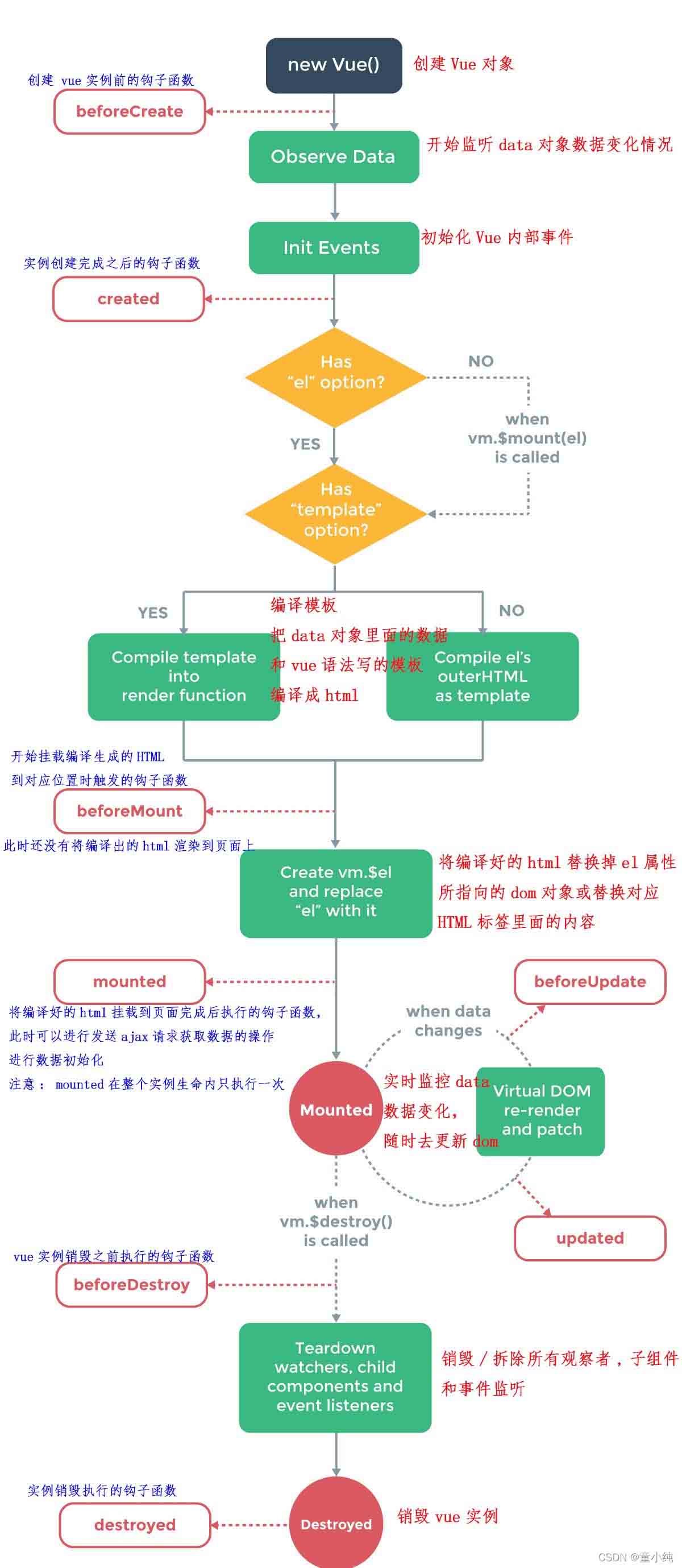vue methods、mounted使用方法
姚华军 人气:0methods、mounted的使用方法
created:html加载完成之前,执行。执行顺序:父组件-子组件mounted:html加载完成后执行。执行顺序:子组件-父组件methods:事件方法执行。watch:去监听一个值的变化,然后执行相对应的函数。computed:computed是计算属性,也就是依赖其它的属性计算所得出最后的值
export default {
name: "draw",
data(){ //定义变量source
return {
source:new ol.source.Vector({wrapX: false}),
}
},
props:{ //接收父组件传递过来的参数
map:{
//type:String
},
},
mounted(){ //页面初始化方法
if (map==map){
}
var vector = new ol.layer.Vector({
source: this.source
});
this.map.addLayer(vector);
},
watch: { //监听值变化:map值
map:function () {
console.log('3333'+this.map);
//return this.map
console.log('444444'+this.map);
var vector = new ol.layer.Vector({
source: this.source
});
this.map.addLayer(vector);
}
},
methods:{ //监听方法click事件等,执行drawFeatures方法
drawFeatures:function(drawType){}
}
}vue生命周期(methods、mounted)
1.什么是生命周期
首先,我们了解一下"生命周期"这个词。 通俗的来说,生命周期就是一个事务从出生到消失的过程。例如,一个人从出生到去世。 在vue中,vue的生命周期是指,从创建vue对象到销毁vue对象的过程。
Vue实例有一个完整的生命周期,也就是从开始创建、初始化数据、编译模板、挂载Dom、渲染→更新→渲染、卸载等一系列过程,我们称这是Vue的生命周期。通俗说就是Vue实例从创建到销毁的过程,就是生命周期。
在Vue的整个生命周期中,它提供了一系列的事件,可以让我们在事件触发时注册js方法,可以让我们用自己注册的js方法控制整个大局,在这些事件响应方法中的this直接指向的是vue的实例。
2.钩子函数
【解释】:
- 钩子函数是Vue框架中内置的一些函数,随着Vue的生命周期阶段,自动执行
- 钩子函数是Vue框架中内置的一些函数,随着Vue的生命周期阶段,自动执行
【作用】:
- 特定的时间,执行特定的操作
- 特定的时间,执行特定的操作
【分类】:
- 四大阶段,八大方法
| 阶段 | 方法名 | 方法名 |
|---|---|---|
| 初始化 | beforeCreate | created |
| 挂载 | beforeMount | mounted |
| 更新 | beforeUpdate | updated |
| 销毁 | beforeDestroy | destroyed |
3.Vue生命周期之初始化阶段
【图示】:

【代码演示1】:
<!DOCTYPE html>
<html lang="en" xmlns="http://www.w3.org/1999/xhtml">
<head>
<meta charset="UTF-8">
<meta http-equiv="X-UA-Compatible" content="IE=edge">
<meta name="viewport" content="width=device-width, initial-scale=1.0">
<title>Title</title>
<script src="js/vue.min.js"></script>
</head>
<body>
<div id="root">
<h2 :style="{opacity}">欢迎学习</h2>
{{ change() }}
</div>
</body>
<script type="text/javascript">
Vue.config.productionTip=false;
new Vue({
el:'#root',
data:{
opacity:1
},
methods:{
change(){
console.log('开启了一个定时器')
setInterval(()=>{
this.opacity-=0.01
if(this.opacity<=0)
{
this.opacity=1
}
},16)
}
}
})
</script>
</html>【代码分析】:

【代码演示2】:

<template>
<div>
<h3>生命周期函数</h3>
<button @click="message='测试'">修改数据</button>
<p>{{ message }}</p>
</div>
</template><script>
export default {
name: "life",
data(){
return {
message:"hello"
}
},
beforeCreate()
{
console.log("beforeCreate -->创建前");
console.log(this.message);
},
created(){
console.log("created -->创建后");
console.log(this.message);
},
beforeMount(){
console.log("beforeMount --> 渲染前");
console.log(this.message);
},
mounted(){
console.log("mounted --> 渲染后");
console.log(this.message);
},
beforeUpdate(){
console.log("beforeUpdate --> 修改前");
console.log(this.message);
},
updated(){
console.log("updated --> 修改后");
console.log(this.message);
},
beforeDestroy(){
console.log("beforeDestroy --> 销毁前");
console.log(this.message);
},
destroyed(){
console.log("destroyed --> 销毁后");
console.log(this.message);
}
}
</script>
<style scoped>
</style>以上为个人经验,希望能给大家一个参考,也希望大家多多支持。
加载全部内容